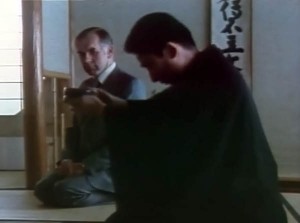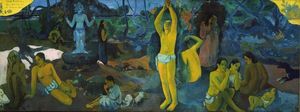March 6, 2012 at 2:40 pm
Fabiana Cabral (Core ‘08, CAS ‘10), a member of the EnCore steering committee, writes:
Students of Core versed in the second semester of the Natural Sciences will no doubt remember the sharp comparisons in CC106 between the aggressive behavior of chimpanzees and the frisky alternative attitudes of their gentle bonobo cousins. The WEEK Magazine reports a study indicating that besides engaging in sex to resolve conflicts and blow off steam, bonobos also have sex to climb up the social ladder. Apparently, lower-ranking female bonobos emit calls during sex to show off to other females (particularly high-ranking ones). This helps establish new females in a group as desirable and worth notice.
But as a good former Core student, you’d do well to remember the link above is from a secondary source article, and has thus been modified to sound more entertaining and omit pesky scientific details. The primary source article can be found here.
By Core Alumni
|
Posted in alumni, EnCore, EnCore Authors
|
March 6, 2012 at 12:47 pm
If all the students who slept in CC106 were laid out on the ground, end to end... Read More »
By CAS Core Curriculum
|
Posted in Tuesday Humor
|
Tagged CC106, humor, joke
|
March 6, 2012 at 12:35 pm

Well, that's Philosophy I've read, / And Law and Medicine, and I fear / Theology, too, from A to Z; / Hard studies all, that have cost me dear. / And so I sit, poor silly man / No wiser now than when I began.
[Habe nun, ach! Philosophie, / Juristerey und Medicin, / Und leider auch Theologie! / Durchaus studirt, mit heißem Bemühn. / Da steh’ ich nun, ich armer Thor! / Und bin so klug als wie zuvor...]
–– the scholar Faust, speaking in Goethe's play by that name (lines 354–59), and sounding rather like a Core student growing impatient for the start of the spring break recess. Translation by David Luke.
By CAS Core Curriculum
|
Posted in Analects
|
Tagged Analects, CC202, Faust, Goethe, scholarship
|
March 2, 2012 at 10:58 am
Fabiana Cabral (Core ‘08, CAS ‘10), a member of the EnCore steering committee, writes:
Attending an EnCore Book Club meeting is a great way to witness how well-placed adult beverages can truly stoke the creative fires of literary debate. While we all come for the books and good talk (not to mention free Chinese food or pizza), I don't think our meetings would be the same without the wine and beer generously provided for us.
It seems we aren't the only ones who agree. Based in San Antonio, The Oil Barons Society of Texas enjoys their discussions with copious shots of Bourbon. Sounds idyllic (except for the shot part). The one catch? It is an exclusive, men-only book club. And I thought I would cease to see "No Girls Allowed" signs when I left elementary school.
Read about this otherwise exemplary group (and their mostly masculine book choices) in this piece posted on the website magazine The Millions.
By Core Alumni
|
Posted in alumni, EnCore, EnCore Authors
|
February 28, 2012 at 12:52 pm
 The human brain is an amazing device. Every day, without fail, it starts right up, working away at full speed the moment you wake up in the morning... Read More »
The human brain is an amazing device. Every day, without fail, it starts right up, working away at full speed the moment you wake up in the morning... Read More »
By CAS Core Curriculum
|
Posted in Tuesday Humor
|
Tagged joke
|
February 23, 2012 at 5:50 pm

During his introduction this morning of Prof. Elizabeth ten Grotenhuis before her lecture to the students of CC102 on the arts of Asia, Prof. Eckel made reference to The Long Search, a famous 1977 BBC series on the religious philosophies of the world. Specifically, he mentioned the scene in Volume 9 ("Japan: The Land of the Disappearing Buddha") in which correspondent Ronald Eyre observes a traditional tea ceremony with two Zen masters -- watch this scene on YouTube.
By CAS Core Curriculum
|
Posted in video
|
Tagged Asia, Buddhism, CC102, Japan, video, Zen
|
February 22, 2012 at 10:33 am

In lieu of the Tuesday lecture lost this week to the Monday substitution schedule, a special roundtable at the BU Castle has been arranged for students of CC202. Prof. Roye Wates, Prof. Peter Schwartz and Prof. Christopher Ricks will be speaking about different aspects of the Faust tradition. The event will begin at 7 PM, at 225 Bay State Road. Refreshments will follow. All students and alumni are welcome to attend; attendance is expected for students enrolled in CC202.
By CAS Core Curriculum
|
Posted in Core Lecturers, Events
|
Tagged Castle, CC202, Faust, Goethe, lecture, Ricks, Schwartz, Wates
|
February 17, 2012 at 12:32 pm
 Professor Daniel Hudon (Core Natural Sciences) writes...
Professor Daniel Hudon (Core Natural Sciences) writes...
What’s the best kind of conversation to have, with those who share your views or those who don’t? If you want to have anything beyond a mutually agreeing chat, then you’re going to want to seek out interlocutors who don’t share your views because they’re the ones who are going to challenge you to articulate what you really think and push you in new directions intellectually. In fact, you know you’re in a good conversation when you start finding out what it is that you think about something.
The Santa Fe Institute, a sort of think-tank for scientists’ seems to take this idea to heart. Not only are scientists in on the conversation, so are playwrights, philosophers and novelists. These days, the novelist at Santa Fe is Cormac McCarthy and before him was Rebecca Goldstein, who spent most of her time “falling into conversations about physics, evolution, the existence of free will.” Sound familiar? Now, rather than touting the novel, Cormac McCarthy simply tries to be curious and ask good questions.
This article in The Daily Beast about the Institute makes that point that “science is fundamentally human in that it involves not understanding things. We spend a lot of time in pursuit of the questions.” It's THIS pursuit which really must be our goal. To get beyond the questions about the mechanics of the subject and get to the fundamental questions of nature, like Paul Gauguin’s Where do we come from? What are we? Where are we going?
Where are the borders between the sciences and the humanities? Where are the edges of our subjects? Do we understand the question?
*
NB: Did you know that the Gauguin painting Prof. Hudon references (and which is pictured at the top of this post) is part of the permanent collection at the Museum of Fine Arts, Boston? Avail yourself of your free admission with a BU student ID, and go take a look!
By CAS Core Curriculum
|
Posted in Great Questions, Other Publications
|
Tagged interdisciplinary, novels, Other Publications, philosophy, Science
|
February 9, 2012 at 2:40 pm
Get a jump on all you Valentine's Day festivities by joining us for a Core Student/Faculty Reception in the Core Office from 3 to 5 PM tomorrow (Friday) afternoon. We will explore and rank exceptional cookies and pastries from around the Boston area, with special emphasis on our own neighborhood in Boston and Brookline. This is a great time for informal conversation with students and faculty from both years of the Core.
By CAS Core Curriculum
|
Posted in Announcements, Culinary Arts, Events
|
Tagged food, reception
|
February 8, 2012 at 1:32 pm
Erin McDonagh (Core '08, CAS '10), a member of the EnCore steering committee, writes:
In this article by Carlos Fraenkel of Boston Review, we learn that Brazil’s public education policy has surprising stipulation: According to a 2008 law, students are required to study philosophy for three years in high school. The law is a political reaction against the country’s recent history: “The official rationale…is that philosophy ‘is necessary for the exercise of citizenship,’” and from 1971-1985, the military dictatorship that ruled Brazil outlawed philosophy, replacing it with classes on citizenship and loyalty to the state. The military leaders seem to have recognized something Core students are taught: that studying philosophy creates an endless chain of questions about freedom, enlightenment, equality, reason, and justice, all principles alien to an autocratic regime. Brazil’s relatively new democracy and its public education have taken active resistance against creating the conditions for such a regime, teaching students to ask these questions about the world around them. Read More »
By CAS Core Curriculum
|
Posted in EnCore Authors, Great Ideas, Great Questions
|
Tagged education, Other Publications, pedagogy, philosophy, Plato, Socrates, teaching
|





